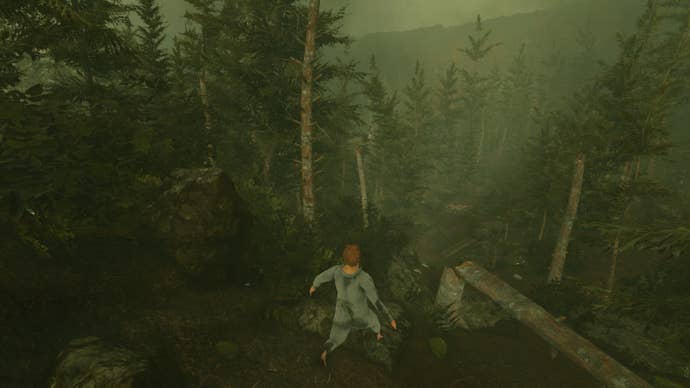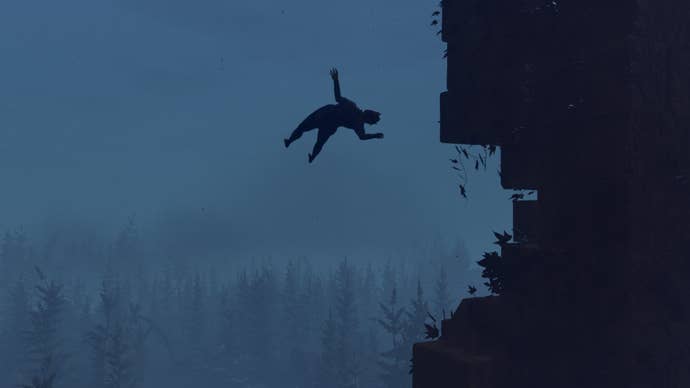Many years ago, my brother and I climbed the moor above our town and, for reasons that elude me, decided to roll to the bottom of it. We hugged each other and threw ourselves off the path into an ocean of heather and bracken. This was, to be clear, a bloody stupid thing to do. That moor is full of potholes, sheep bones, barbed wire and animal turds of all flavours. If there were any justice in the cosmos, I’d have banged my bonce on a boulder and be pushing up daisies. But somehow, we reached the outskirts of the town basically unscathed, and it was glorious.
We went tumbling over ledges and into ditches, sucking in careless lungfuls of spores and laughing like seals. I felt a sense of para-Wordsworthian abandon and intimacy with rocks and stones and trees, that I haven’t ever felt since. I caught a trace of that feeling in Baby Steps, the new open world fail ’em up from a team led by Bennett Foddy, in which you move each leg of a body subject to believable physics, and the challenge is therefore to walk more than two paces without keeling over.
Watch on YouTube
Baby Steps has been presented as a vehicle for gamer masochism and a Flight of the Concordsy send-up of anxious-depressive failsons, but I didn’t really get that from my demo. Or at least, I didn’t get only that. It felt more like a celebration of the experience of owning disobedient flesh than a shaming of the protagonist, and I’m hoping that’s the moral of the full game’s story.
Main character Nate begins the game frozen to a sofa in his parents’ basement, calcifying in the glare of a flatscreen. We hear them loudly despairing of his inability to get a life upstairs. Then, Nate is transported to a peculiar wilderness. A stranger in tatty orange emergency gear pops up from the bush like Nagg from his trashcan, offering to explain the situation, but Nate shrinks automatically from these overtures and toddles off to search for a toilet. He thinks it’s all some kind of ‘intervention’. I’ve been there, Nate. I too have arbitrarily shrugged off help in a mood of passive-aggressive bitterness. Mind you, I’m not wholly sure I trust the other dude, whose kindly hectoring occasionally reminds me of Dante’s Virgil and occasionally of a mollycoddling P.E. teacher.
Here is how you step in Baby Steps: you clench a controller trigger to raise one leg, lean Nate’s body with left analog stick to take a stride, then clench the other trigger to step with the other leg. The right analog stick controls your orientation, but it only turns Nate’s head, not his body with it, so you’ll need to perform smaller steps to change direction.
Walking in a straight line isn’t actually that hard, given some nice flat earth. In places, I was skipping over the terrain like a Morris dancer. But the terrain is seldom that accommodating. It is full of dips and rises and slippery patches and low obstacles. Hence the notion that this is a game for people who love punishment, and for streamers who profit by making a spectacle of their own humiliation.

Is it, tho? Baby Steps’ title may sound like an infantalising putdown of its protagonist, but in this era of Dualshock uniformity, it is genuinely wonderful to learn to walk “for the first time”. Especially in the context of an open world game, a genre that prides frictionless exploration like few others. There are glowing waypoints on the skyline, but you can’t just zip along the obvious routes. You have to study what’s underfoot and organise your mass accordingly, and when you fall, it’s at once ludicrous and frustrating and a source of connection.
You notice how certain helpful rocks snag at Nate’s limbs, stopping him rolling too far. You see how he catches himself on his elbows as he slides, a tentative advertisement for having some degree of survival instinct. You appreciate the torquing of his spine as he bumps and slithers, and you feel the smaller, context-sensitive adjustments to what the controls do – the little, evolving motions that are presumably far too thoughtless and subtle to be offered up in a tutorial.
Swimming, for instance. At one point I tripped while tottering over a bridge and fell into a stream, which bore me off to a shallow pool. Nate refuses to use his upper arms, at this stage at least, so breast stroke and front crawl are beyond him, but you can kick your legs frantically to hove along facedown. It’s agonising to behold, but also wonderful. Look at him go! Look at the flying spray! I can think of one other recent video game character who has this much ‘fun’ in the water – Mask Quest’s hyperventilating lead, who swills and sputters it out with panic and gusto.
Games like Mask Quest and Baby Steps reveal how accustomed we are to being denied embodiment in video games, for all the promise of letting us inhabit bodies we can otherwise only dream of. In Assassin’s Creed, for example, holding the trigger relinquishes a large measure of muscular exuberance to the simulation. The avatar leaps and mantles and clambers and flows while the player settles into the role of piggyback driver, issuing broad direction.
I realise this is a bit facetious – abstraction is necessarily inherent to video games. But so much possibility is routinely squandered in the name of power fantasy. In most games, the player is permitted only to savour the ‘hero moves’, like punches and dodges, and rarely the smaller or less purposeful idiosyncracies of the flesh, the fumbles and frolics of inexpertly wielded matter.

It’s one of a few things I unreservedly like about Quantic Dream’s Heavy Rain: its bespoke inputs for entirely ordinary activities such as opening doors and turning faucets. Lodged in amongst the auteurly see-that-handle-you-can-QTE-it bullshit there is sincere enthusiasm for levels of bodily being that other games tastefully minimise. And as in Baby Steps, there’s genuine pleasure to derive from screwing up and watching your Finchery private-eye go arse over tit.
The video game industry’s abstraction of bodily agency overlaps with its insistence on celebrating certain kinds of bodies – the kind that have six packs and strong thighs. Baby Steps resists this as well, albeit in ways that could backfire. Nate appears overweight and possibly disabled, depending on how literally you interpret his behaviour, and Baby Steps is clearly angling to be some kind of comedy (the marketing blurb boasts of a “fully dynamic onesie soilage system”).
As such, the game has a difficult line to walk in terms of subverting expectations for video game bodies without playing the tuba against footage of an obese and suffering person falling over. Another developer might have taken the Wholesomeness route and erased all sign of stigma, but Baby Steps feels more useful, to me, in anticipating an unkind response, and making all that cruelty and shame part of the picture.
Here’s hoping that it resolves these mixed feelings constructively. And here’s hoping that they find a way to support co-op, so that my brother and I can relive our childhood moorland escapades without putting our older, heavier and less flexible bodies through the wringer. You can find a demo for Baby Steps on Steam.







